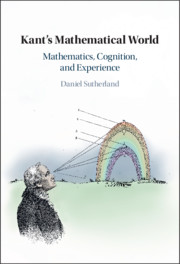Book contents
- Kant’s Mathematical World
- Kant’s Mathematical World
- Copyright page
- Dedication
- Contents
- Preface and Acknowledgments
- 1 Introduction
- Part I Mathematics, Magnitudes, and the Conditions of Experience
- 2 Space, Time, and Mathematics in the Critique of Pure Reason
- 3 Magnitudes, Mathematics, and Experience in the Axioms of Intuition
- 4 Extensive and Intensive Magnitudes and Continuity
- 5 Conceptual and Intuitive Representation
- Interlude The Greek Mathematical Tradition as Background to Kant
- Part II Kant’s Theory of Magnitudes, Intuition, and Measurement
- Bibliography
- Index
2 - Space, Time, and Mathematics in the Critique of Pure Reason
from Part I - Mathematics, Magnitudes, and the Conditions of Experience
Published online by Cambridge University Press: 21 October 2021
- Kant’s Mathematical World
- Kant’s Mathematical World
- Copyright page
- Dedication
- Contents
- Preface and Acknowledgments
- 1 Introduction
- Part I Mathematics, Magnitudes, and the Conditions of Experience
- 2 Space, Time, and Mathematics in the Critique of Pure Reason
- 3 Magnitudes, Mathematics, and Experience in the Axioms of Intuition
- 4 Extensive and Intensive Magnitudes and Continuity
- 5 Conceptual and Intuitive Representation
- Interlude The Greek Mathematical Tradition as Background to Kant
- Part II Kant’s Theory of Magnitudes, Intuition, and Measurement
- Bibliography
- Index
Summary
Chapter 2 explains the place of mathematics in Kant’s Critique of Pure Reason. The Transcendental Aesthetic and the Axioms of intuition both make claims about mathematics that overlap and also appear inconsistent concerning the possibility and the applicability of mathematics. This has baffled prior commentators, leading them either to claim that Kant was inconsistent or to introduce distinctions to render him consistent. Two of those distinctions are between pure and applied mathematics and between general “topological” mathematics and a mathematics that includes a metric. Both these interpretations are supported by the fact that the Axioms of Intuition makes important claims about the applicability of mathematics, but the interpretations cannot be sustained. A consideration of the treatment of space and time in the Transcendental Aesthetic and the Axioms of Intuition faces parallel tensions. Examining the latter tensions points to a distinction between indeterminate space and time and determinate spaces and times as a solution, which also solves the tension concerning mathematics. This resolution allows us to see that the Axioms of Intuition concerns not just applied mathematics and not just the introduction of a metric, but all mathematics, topological or otherwise, and both pure and applied.
Keywords
- Type
- Chapter
- Information
- Kant's Mathematical WorldMathematics, Cognition, and Experience, pp. 29 - 57Publisher: Cambridge University PressPrint publication year: 2021



